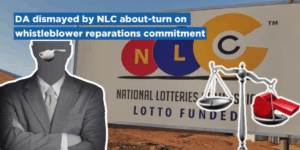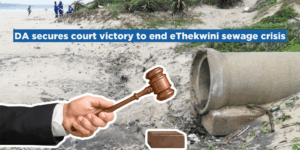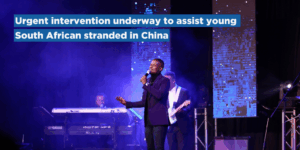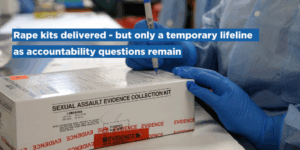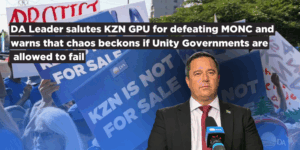The following speech was delivered by the DA Leader, John Steenhuisen MP, during his address to the nation regarding the ongoing leadership crisis in SA.
Fellow citizens,
On Saturday we reached the hundred-day mark since our country went into lockdown. This is a long time, and I’m sure for many of you it feels even longer.
But the truth is we are still in the early days of dealing with this virus. Even with the world’s best scientists working day and night to develop a treatment or vaccine, it could be another 18 to 24 months before this becomes available.
We have to learn to live with the virus, as safely as we can.
Whether we like it or not, we’re in for the long haul, and this long haul cannot be life under lockdown. If people are to survive, our country needs to function. Every part of it.
We simply don’t have the reserves and surpluses that many other countries do. Each little compromise to our economy will put thousands more out of work and in danger of extreme poverty and hunger.
All our efforts now must go towards being economically active and productive once more, while doing all we can to avoid becoming infected.
And I don’t mean that our economy should function as it did before Covid. We need to do far better than that. Because even before Covid, the writing was on the wall and millions had no hope of finding work.
We can’t go back there. That’s not the benchmark. If we’re talking about a “new normal”, let our new normal be one of raised expectations and of goals worth pursuing.
Let our new normal be a brand new paradigm for our country.
Let’s use this opportunity to flip the script and walk away from the failed project of centralised state power, and instead give more power to the people of South Africa.
Let our new normal incorporate all the long-overdue reforms to our economy that the president and finance minister have been talking about, but can never seem to implement.
This is our opportunity, so let’s do it right.
We have already adjusted to so many new things in our lives these past three months, we should have no problem getting used to a few more changes – a South Africa without an SAA, or one in which Eskom doesn’t hold a stifling monopoly.
We’ll easily adapt to a new normal of flexible labour laws, and a trimmed-down public sector.
Let our new normal include a state that is actually able to deliver because it is staffed by the best, and not by political appointments.
If we’re using this opportunity to recalibrate and reset the clock, let us do it properly.
But all of this will require real leadership. And that is something we have not seen from our president since that first announcement of a lockdown a hundred days ago.
We have seen a lot of muscle flexing from ministers around meaningless regulations.
We have seen plenty of force and brutality used against our citizens.
We have seen inexplicable decisions that have caused untold harm to our economy with no measurable impact on the virus.
We have seen ministers repeatedly slapped down by our courts for abusing their power during this crisis.
But we are yet to see leadership from the one man who matters.
Throughout all of this – as the rogue ministers of the National Command Council compounded our problems with petty regulations, as our hospitals filled up and our economy imploded – President Ramaphosa has been little more than a spectator.
We needed someone to step up and take charge, but what we got was a president obsessed with dialogues, reaching out and building consensus.
And this has been the story of his presidency to date: a lot of talk and a lot of promises, but very little action or leadership.
Going into this crisis he had all the public support he needed if he truly wanted to be bold, but he squandered it.
Martin Luther King once said, “A genuine leader is not a searcher for consensus, but a molder of consensus.”
We desperately needed the latter, but we got the former.
And that’s not what you want when your country is facing a devastating double-blow of healthcare and economic crisis.
But thanks to this dithering, we now have a third crisis to contend with – a political crisis.
Because while our president has been watching it all unfold from the sidelines, others have been very busy. Most notably, COGTA Minister Nkosazana Dlamini-Zuma.
Since the declaration of the State of Disaster, the unchecked power handed to the COGTA minister has made her our de-facto president. And she has wasted no time digging herself in.
We’ve already seen multiple commitments made by the president on live TV undone a couple of days later by Dlamini-Zuma. Her stubborn refusal to reverse the cigarette ban is her way of letting the president know exactly who is in charge.
And consider that she has the power to extend this State of Disaster indefinitely.
But even that is not enough. This week a top-secret document was leaked to the DA in which the COGTA department put forward several extremely concerning ideas on how they think our country should function.
At the heart of this document is a proposal to extend government’s centralised Command Council system well beyond the Covid19 crisis, and to include provincial command councils.
Simply put, it is a bold play to try and centralise provincial and local government power in the hands of a few.
To call this unconstitutional is an understatement. It is tantamount to a coup, as it attempts to put unelected national politicians in charge of provincial and local government functions, against the wishes of those who voted for these governments.
This is the RET faction of the ANC showing its hand against the Ramaphosa faction. And they feel comfortable doing so because they recognise weak leadership.
They are using the Covid crisis as cover to pull the rug of government from under the president’s feet, and he seems incapable of stopping it.
And all the while our country’s economy and healthcare are imploding as we head towards the really big Covid numbers.
When infections in the Western Cape were rising faster than anywhere else in the country, there was much talk of sending in the big guns, and even of threatening the province with a return to hard lockdown.
But now that provinces like the Eastern Cape and Gauteng are collapsing, national government is strangely silent.
What happened over the past months in the Western Cape has been extremely traumatic and challenging, and the province is not out of the woods yet by a long shot.
But the numbers show that the interventions there appear to be working. Infections are slowly levelling off, and hospitals – while full – have not yet been overrun as we have seen in other parts of the world.
This is no doubt thanks to the preparation of the provincial government. We know what they did to “raise the line” in terms of hospital capacity because they constantly showed us.
We saw new field hospitals at the CTICC, Khayelitsha, Brackengate and various other locations. We saw the increase in intensive care and high care beds. We saw oxygen and ventilator availability.
We knew, at all times, where and whom they were testing in order to try and contain local transmission.
In other words, we saw what this provincial government had been doing since the day they became aware of the looming crisis.
But elsewhere we have seen almost nothing. No one knows how the past fourteen weeks of lockdown were spent readying Eastern Cape hospitals for the imminent wave of Covid cases.
No one knows how many extra beds Gauteng has prepared. We haven’t seen their field hospitals. We haven’t seen their ventilators and their oxygen tanks.
And we’ve seen even less from places like KZN, Limpopo and Mpumalanga.
What we have seen from these provinces is patients fighting each other for oxygen, and entire hospitals being closed down.
Can you imagine how distressing all of this must be for those in high-risk categories?
And why are we in this position in July when we should have been preparing since March?
The purpose of the lockdown was to try and hold the virus outside for just a little longer so that we could get these things in order.
South Africans were asked to sacrifice all they had for this sole purpose. What can you possibly say to people who lost everything in the lockdown if it turns out they did it for nothing?
What do you say to vulnerable people – the elderly or those with co-morbidities – in places where the system clearly cannot cope?
But even more importantly, what will our president do about it?
President Ramaphosa, if you’re in charge, and not Minister Dlamini-Zuma, then you need to stop being a spectator to all of this and step up to the plate.
Your country needs you to do better.
Don’t be too proud to ask for help and advice from those who have already been through it.
The experience of the Western Cape provincial leadership these past few months should be of immense value to the rest of the country right now. Given what we’re seeing with the numbers there, surely these are strategies we should be replicating.
Speak openly and clearly about your plan. People need to know what’s in store for them, and they need to plan accordingly.
Businesses can’t possibly operate under chaotic regulations and with the threat of re-entering lockdown hanging over their heads.
When it comes to spending money to build prevention and treatment capacity, nothing is too much. Money should not be the problem here.
Held up against the vast amounts that have been wasted on bailing out failed SOEs like SAA – and now also bailing out the failed e-toll programme – the cost of raising the healthcare line and ramping up our testing programme is not that high.
Cut those other things and spend where it matters.
We also need to make far better use of the expertise that exists in the private sector.
Government is not in this fight alone. There are many experts out there who are able and willing to help get our testing and prevention efforts back on track. You need to reach out to them.
But above all, you must be rational when dealing with this crisis. Don’t allow your party’s factional battles, ideology or egos to get in the way of common sense.
We know, given the perilous state of our healthcare, that we cannot rely on treatment to safeguard us from this virus, and so we need to really up our prevention game.
We also know far more about the airborne spread of the virus than we did three months ago, and we have to advise citizens correctly.
One of your most important jobs, Mr President, is to tell people how to best protect themselves.
It is crucial that people always remember the three most important things that affect their chances of becoming infected: their distance from an infected person; the dose of the virus they get which depends on the time spent near this person; and the degree to which the virus is dispersed in the air.
Whatever we allow in terms of gatherings or socialising has to take these three D’s into account: distance, dose and dispersal.
In other words, always maintain distance, try not to stay close to people any longer than you have to, and try to keep the air moving by either being outdoors or by having the windows open.
We know that gatherings of people are super-spreaders, and we know that this is far worse when it happens indoors. So let’s take our small gatherings and our socialising outdoors wherever possible.
This means lifting the remaining irrational bans on beaches, parks and other outdoor places.
Let us always wear our masks when necessary and wash our hands frequently.
And let us encourage those at high risk to remain in voluntary isolation until it is safe. This includes respecting the safety of employees with co-morbidities as we all return to work.
These are the things we all can and must do to ensure our own personal safety.
What you need to do, Mr President, is take charge.
Use your position and the support you still have to fight for the safety of our citizens. Always put them first.
If the choice is between e-tolls and hospital beds, choose the beds.
If the choice is between SAA and a comprehensive testing strategy, choose testing.
And if the choice is between your party and your country, always choose your country.
That is the duty of the president. And right now our country needs a president and not just another spectator.
Click here to contribute to the DA’s legal action challenging irrational and dangerous elements of the hard lockdown in court
